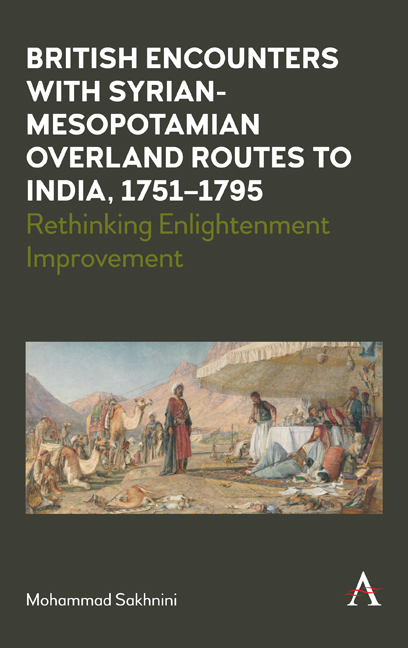 British Encounters with Syrian-Mesopotamian Overland Routes to India, 1751-1795
British Encounters with Syrian-Mesopotamian Overland Routes to India, 1751-1795 Book contents
- Frontmatter
- Contents
- Acknowledgment
- Introduction: Pluralising The Enlightenment: Improvement And Cross-Cultural Encounters
- Chapter One Improvement of Knowledge: John Carmichael’s A Journey From Aleppo to Busserah, Over the Desert (1772)
- Chapter Two Polite Englishman in the East: Edward Ives’s Journey from Persia to England (1773)
- Chapter Three Commerce, Virtue and Improvement: Abraham Parsons’s Travel in Asia and Africa (1808)
- Chapter Four Henry Abbott: A Cosmopolitan in Cities and Deserts
- Chapter Five Eyles Irwin’s Travels: The Politics of Adventure in the Levant
- Chapter Six Political and Moral Improvement: Donald Campbell, A Journey Overland to India Partly by A Route Never Gone Before by Any European (1795)
- Conclusion
- Unpublished Manuscripts
- Reference List
- Index
Chapter Five - Eyles Irwin’s Travels: The Politics of Adventure in the Levant
Published online by Cambridge University Press: 15 November 2023
- Frontmatter
- Contents
- Acknowledgment
- Introduction: Pluralising The Enlightenment: Improvement And Cross-Cultural Encounters
- Chapter One Improvement of Knowledge: John Carmichael’s A Journey From Aleppo to Busserah, Over the Desert (1772)
- Chapter Two Polite Englishman in the East: Edward Ives’s Journey from Persia to England (1773)
- Chapter Three Commerce, Virtue and Improvement: Abraham Parsons’s Travel in Asia and Africa (1808)
- Chapter Four Henry Abbott: A Cosmopolitan in Cities and Deserts
- Chapter Five Eyles Irwin’s Travels: The Politics of Adventure in the Levant
- Chapter Six Political and Moral Improvement: Donald Campbell, A Journey Overland to India Partly by A Route Never Gone Before by Any European (1795)
- Conclusion
- Unpublished Manuscripts
- Reference List
- Index
Summary
The flow of ideas and civilization was for long ages from the East to the West, and not as is now the case, from the West to the East.
—Charles MacFarlane, The Romance of Travel: The East (1846)Eyles Irwin was born in Calcutta, India, in 1751. His father, James Irwin, was a merchant in St Helena and Java in the 1730s. In the 1740s, he ‘received direct employment by the [East India] Company’, the historian Barry Crosbie wrote, which allowed him to make fortunes that enabled him to buy the Hazeleigh estate in Essex (Crosbie 2011: 40). At an early age, Eyles Irwin’s father sent him to England to study at a private academy in Chiswick. In 1771, via his family’s connections with the director of the East India Company at the time Laurence Sullivan, Irwin was offered a position in the Madras civil service and a few years later he rose in the EIC ranks to be a ‘superintendent of the company’s grounds within the bounds of Madras’. While in Madras, Irwin succeeded to gain the trust of the governor of Madras, Lord Pigot (George Pigot [1719–1777]), who was appointed to restore the province of Tanjore to the Rajah. Irwin’s ambitions were shaken when Pigot died in his prison in St Thomas Mount in 1777shortly after the Madras Council ousted him. Immediately after Pigot passed away, Irwin was suspended because he didn’t follow the new leadership headed by George Stratton, Henry Brooke and Charles Floyer. Soon after, Irwin returned to Britain by the Red Sea route via Suez, but two years later he was reinstated to the service. In 1783, he returned to India by the Syrian-Mesopotamian routes. In the same year, Lord McCartney (George McCartney), the governor of Madras, endorsed Irwin’s talents to the East India Company. He appointed him to administer the provinces of Tinnivelly and Madurah. In 1793, Irwin was further promoted: he sat on the ‘Secret and Superintending Committee of Supra Cargos for the Company’s Affairs in China’.
Irwin’s colleagues and friends in Madras and Bengal consisted of Britons who had powerful connections and possessed huge wealth both in India and Britain. One such Briton was the rich money speculator Paul Benfield who was stationed in Bengal but was involved with commercial affairs in Madras.
- Type
- Chapter
- Information
- British Encounters with Syrian-Mesopotamian Overland Routes to India, 1751-1795Rethinking Enlightenment Improvement, pp. 161 - 190Publisher: Anthem PressPrint publication year: 2023


